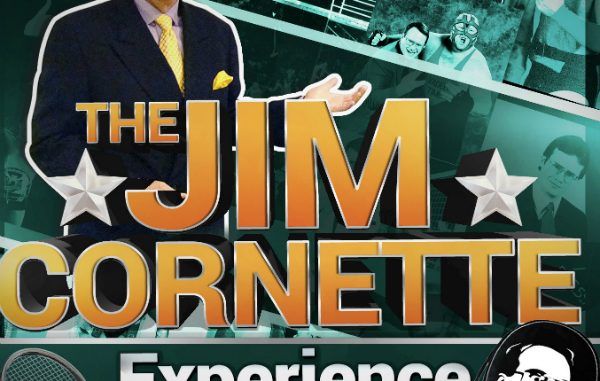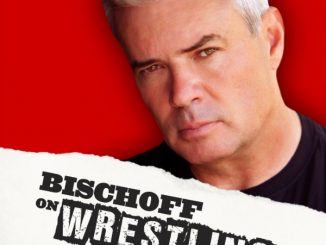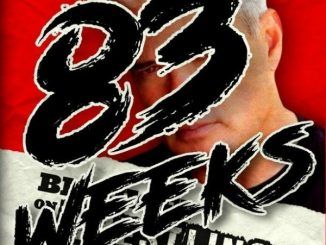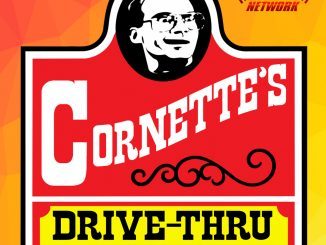
The Jim Cornette Experience Episode 214 – The Last Months of Jim Crockett Promotions
Release Date: January 11, 2018
DIRECT LINK TO LISTEN/DOWNLOAD
Recap By: Mark Charles Adams
Top Stories/Moments of interest
- Another in depth look at the slow death of Jim Crockett Promotions!
Recap
00:00:00 – Intro: Jim welcomes us to the show and promises a very special one for wrestling nerds. Not only will this show look back at January 1989, but also the year that lead up to it; how did Crockett react when he realized how bad the company was financially, and how did Dusty react to that in the booking. He then introduces co-host Brian Last.
00:01:43 – Death of Marie “Ma” Bolin: Jim talks about the sad death of Starmaker Kenny Bolin’s mother. They discuss how long Jim had known her and how she was such a local character in and around Ohio Valley Wrestling. Jim notes that once, she even managed Jerry “The King” Lawler, in a match against her own son.
00:06:32 – Brian’s back and TV adverts: Jim brings up how Brian’s chair fell apart just as they were about to record and how dangerous that was. Brian says he’d have been okay as he knows how to take a bump after attending the Smokey Mountain family training session two years in a row. Jim remembers an old SMW promo where they used the sign off “We’ll sell you the seat, but all your need is the edge!”
Brian then asks about a ’70s TV advert he’d heard about where Dusty Rhodes fronted a campaign that ended with a large woman announcing, “Come on Dust! I wanna boogie!” and Jim says it was for a pain relief powder. But also notes Dusty did a lot of television commercials in different regions.
00:10:01 – Fire and Fury: Jim and Brian discuss the recent furore around Michael Wolff’s book and note they are waiting for their copies in the mail still. Jim calls Steve Bannon the Eddie Mansfield of the Trump Whitehouse, saying he exposed the business in the same way Mansfield did in the ’80s. Brian says that he read a book called Last Tycoon from the early ’90s, which showed what Trump was like a long time before he was in politics. Brian also mentions a book called Devil’s Bargain from 2017, by Joshua Green, which Steve Bannon was also the key source for. They then joke about how close the Trump administration is to a wrestling promotion falling apart.
00:15:40 – Cornette’s collectibles ad.
00:19:15 – 605 and other podcast ads.
00:21:50 – Business in 1988: Jim talks about the response to last week’s show on January 1988. People wanted to know more about Dusty’s booking as Crockett took the blame for the business falling apart. He notes one time on the plane Dusty reportedly said “boys, this time next year we’ll be making major motion pictures and sitcoms.” Jim says that was less than a year before Learning The Ropes premiered and so there was some truth in it.
Jim sets the scene saying booking was bad from late 1987. Crockett had been buying up various territories in an attempt to replicate the success WWF had. They had to fill TV time slots even though the money committed wasn’t coming back in the syndication fees as expected. Add to that the pressure Vince McMahon had put on pay-per-view systems to not carry the Crockett shows and things were not looking great.
Even in March of 1988 there was still belief that the TV revenue was coming and Jim and the Midnight Express, signed a new contract for over $200,000. In April they knew the money wasn’t coming and talks began with TBS. Jim notes contracts promised show pay offs to cover the minimum guarantee, then if the shows hadn’t made the talent the contractual amount, you’d receive a “balloon payment” to cover the remaining amount at the years end. He finished saying they were owed over $60,000 at the years end and negotiated with TBS to accept a pay out for this and re-sign with them.
May 1988 – Jim says they had 5 days off in May, and only made $4,900 in the whole month, which was down from the January discussed on the last show.
June 1988 – 11 days off, $4,000 made in payoffs. Jim notes some were intentional as talent was rested before the 40 plus day Great American Bash Tour.
Jim says Dusty knew they was a very good chance the company was going to be sold, and believes he probably wanted to remain booker under a Turner administration, so put a lot of effort into the Bash Tour, but also using it to set up the Fall’s big programs.
July 1988 – $17, 000 made in payoffs for the Bash tour. Jim admits this was Dusty hotshotting shows, but if you were ever going to hotshot, the annual Bash tour was the time to do it.
The tour started with a record house in Orlando, a major card with big names to kick off the tour. Jim says the way The Midnight Express were handled on these shows was a sign of what Dusty had planned for them in the fall, they were kept strong for a potential series of matches with The Horsemen.
Jim adds some more numbers for the next shows saying Greenville made $61,000 and Norfolk, Virginia did $105,000. He then adds what a disappointment the Charlotte show on July 2nd was considered at $98,000 after being one of the biggest shows in previous years tours. Amarillo, Dallas, Miami, and Tampa all pull in $50,000 – $60,000. Heading north, Pittsburgh makes $80,000 and Chicago $100,000 before the Great American Bash pay-per-view in Baltimore. That show drew a sellout 13,000 people for $206,000 headlined by Flair versus Lex Luger which ended in a blood stoppage. Jim says this was leading into Dusty’s plans for rematches of the top Bash matches and ultimately putting the title on Luger.
Jim reels off other shows and numbers and specifically notes how his home show in Louisville, Kentucky drew only $25,000 because the local promotion was still strong and the wrestling audience was taken there. The tour continued to do quite well in most towns and cities, ending with the Los Angeles Forum and Oakland shows. Jim believes the tour put the company back in a stronger position and says some of Crockett’s family were, at this point, reconsidering the sale.
Jim goes on to talk about how Turner Broadcasting interviewed some of the top talent around this time as part of the sale talks, though admits neither he, nor the Midnights were part of this. Even though the Bash tour had been booked strong and was part of a longer term plan for Dusty, everyone seemed to know these interviews featured a lot of bad words for the historical booking decisions. Specifically there was talk from Tully regarding the booking of the Horsemen, because of this, Dusty had Tully banned from Crockett’s plane.
August 1988 – Jim says coming off the Bash tour, August was a strong month. They made $13,000 with 10 days off. Many towns visited in the Bash tours were now sell-out shows. People wanted to see Luger beat Flair for the title and Jim notes that back then, people still believed it could happen in their local arenas.
September 1988 – This was when trouble began to creep in. Dusty’s booking had to change as they began to lose talent. On September 10th The Midnights won the tag belts because Tully and Arn had decided to leave. This obviously also fractured the Horsemen.
Brian interrupts with an anecdote John Hitchcock had told him on one of his other podcasts. John went to all the Greensboro shows during this era, always sitting in Front Row, Section D. During one particularly empty show, Ric Flair walked over to him during an entrance and simply asked “Where is everybody?” John replied “It’s Dusty’s booking.” Flair apparently gave a knowing look and carried on with the show.
Brian then asks Jim what the relationship was like between Ric Flair and Dusty Rhodes during this period. Jim answers that it is often the two top guys who have tension, especially when they have designs on booking themselves and they’ve acted against each other in their preferred roles of heel and babyface. Jim adds at this point, with the Horsemen out to get him, Dusty had started a program to bury Flair.
Jim goes on to discuss how Ted Turner was likely buying the company, in many ways, with Flair in mind as the top draw as he had been when Turner was a fan. Jim says looking at the whole of 1988 from different perspectives you see how bad things looked for everyone. Jim Crockett believed he was in for a boom in business to building it back, to a complete collapse. Dusty was feeling betrayed as things turn against his booking. The rest of the talent feeling lost or were running for the hills.
Jim returns to discussing the build to January. On November 1st the sale officially takes place, which was just after a late October run of small town shows that hadn’t made much money. Tension is still high between Dusty and the remaining Horsemen, but he is rebuilding in the hope of keeping the job post-sale. Dusty decided to attempt a double turn with the Midnights and the Road Warriors, in the hope of building the Road Warriors as a new heel machine.
At this point Jim had come up with an angle to bring in the original Midnight Express and Paul Heyman in to have a Midnight versus Midnight feud. Dusty had agreed and used this as an excuse to turn them face early as the angle was planned to start the next week.
Around this time TBS were planning to do a lot of TV tapings at Centre Stage in Atlanta and Starrcade ’88 had been moved to Christmas. Meanwhile, regular towns like Greensboro and Charlotte were drawing poorly again. While out on a west coast tour, Jim learned Dusty had been fired as the booker and the Midnight versus Midnight angle was about to get watered down. Crockett himself becomes “maintenance booker” and this doesn’t help business.
In December the “Seasons Beatings” show did well in the ratings, but house shows are not a priority for Turner Broadcasting. In December they decided to stop sending Managers to house shows to save money, among other changes. Jim notes they were still given small pay offs for these shows, but were no longer flown to them. Starrcade happens the day after Christmas (a Monday), it sells out and does about as well as could be expected.
Jim announces we’re finally getting to punch line, saying all of this setting the scene finally leads up to January 1989 and is a master class in dismantling a wrestling company. He then goes through January.
January 1st – Traditional New Years day show at the Omni in Atlanta.
10, 000 people saw Jim won a Managers Bunkhouse Stampede, in a show that usually drew well.
January 2nd – TV taping in Columbus, Georgia
January 3rd – TV taping in Albany, Georgia
January 4th & 5th – TV tapings in Atlanta
January 6th – Off. Supposed to be Philadelphia, cancelled by snow storm
January 7th – Baltimore. House: $63, 000
January 8th – Fayetteville, NC afternoon show
House: $6, 000 – Greensboro, NC evening show
2500 people saw Flair versus Junkyard in a traditionally strong town. Jim notes “interest has evaporated”
January 9th – Greenville, NC. House: $3,000. Midnights versus Road Warriors
January 10th – Columbia, SC. House: $23,000
January 11th – Bassett, Virgina
Jim mentions how, at this time, the talent was split between two tours. One doing smaller shows in small towns. While the B-team did this show, the A-team were in Seattle, not drawing an audience.
January 12th – Harrisonburg, Virginia. House: $12,000
Meanwhile the A-team were in Portland, again drawing poorly.
January 13th – Hillsville, Virgina. $11,000
Jim notes the A-team were in Las Vegas this night and the B-crew were probably making more money in their towns ultimately.
January 14th – Cherryville, NC
January 15th – Dallas
January 16th – 19th – Various TV tapings
January 20th – Georgetown, SC
The A-team was in St Louis with an apparently good card, playing to a part empty house.
January 21st – Sumter, SC
Jim notes the A-team drew 4600 people in Kansas City.
January 22nd – 26th – They continue to draw small to medium houses in small towns.
January 27th – Northfolk, Virginia
The same site as Starrcade a month earlier, barely draws a house of $12,000 after selling out in December.
January 28th – Richmond, Virgina
Again, only 3,000 people in a building they’d sold out in September. Jim and Paul E drove themselves, as they weren’t flown in for this show. Jim notes the company realized their decision was bad and started flying them in for shows again in February, but it was too late.
The month finished up with more TV tapings. Jim says George Scott came in as booker at this point, but couldn’t fix things in a hurry. Jim gives him credit for bringing back Ricky Steamboat though.
Jim and Brian go on to say how business didn’t rebound for a long time. From November 1988 WCW wouldn’t draw a profit until 1997, at the height of the NWO. They discuss how Hogan wasn’t even enough to change their fortunes. Brian notes that Turner was paying for Hogan, not even coming out of WCWs budget. They also talk about how more money went straight into Turners coffers, which might have helped, such as pay-per-view revenue going to Turner Home Entertainment.
Jim talks briefly about Flair becoming booker for a short period in late ’89. This period saw a brief rise in TV ratings, but house shows continued to be a nightmare until they eventually stopped doing them for a few years. Eventually Eric Bischoff would be the one to turn around their fortunes in his approach to business.
01:42:02 – Show wrap up.
Rating 7/10
Review
As with last week, this show covers a very specific era in the death of Jim Crockett promotions and the transition to Turner Broadcasting owned WCW, simultaneously in the ultra detailed and scattershot way only Cornette and Brian Last can manage. I obviously can’t really do it prefect justice, but I’ve tried to cover it the best I can. If you can keep up with these talks and catch all the references, then you’re better than me! It’s a fun ride though and I thoroughly enjoy these speed runs through different time periods. If you enjoy the write up, definitely give the show itself a listen.
Timestamps
“00:00:00 – Intro”
“00:01:43 – Death of Marie “Ma” Bolin”
“00:06:32 – Brian’s back and TV adverts”“00:10:01 – Fire and Fury”
“00:15:40 – Cornette’s collectibles ad”
“00:19:15 – 605 and other podcast ads”
“00:21:50 – Business in 1988”
“01:42:02 – Show wrap up”
Writer Bio
Mark is an English storyteller, joker, and drunk.
This week he paid a ridiculous amount of money for Apple to only further break his ailing computer.




Be the first to comment